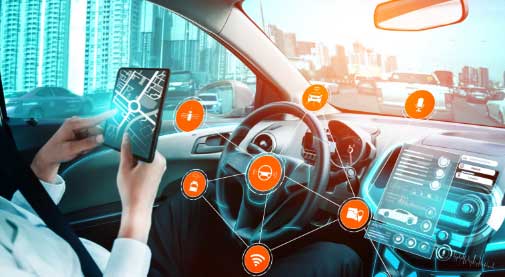What is M2M?
Machine-to-Machine (M2M) communication is an innovative technology that enables adequate supervision and physical assets maintenance. M2M communication has historically served microprocessors, microcontrollers, and sensors with communications, monitoring, and control systems to enhance business capabilities and effectiveness.
Special-purpose M2M devices range in complexity, from single purpose to multi-purpose. They are meant to operate autonomously for most events as per a planned set of operational rules free from outside interference through improving M2M investment return. M2M device suppliers not only fix their M2M modules with firmware that directs hardware components, but they usually supply them with configuration software that allows engineers to establish practices that direct M2M devices’ performance, for instance, corresponding function data with particular actions.
How Can It Benefit Your Business?
When almost everything is connected to the Internet, M2M solutions make life more comfortable for entrepreneurs and their employees. Automation changes the business situation. By relying more on machines to do the work, we can be assured more detailed data, turning to better business decisions.
Relying only on the workforce can have consequences due to human errors. Often, machines that use software and programs can do a much better job because they facilitate the complete process. While they still need human guidance, the decreased error margin makes them an excellent method to cut costs. Among others, the capability to remotely control machines enables businesses to:
Remote Monitoring
In the past, plants needed workers to evaluate the production of each system actively. Now, M2M Solutions are transforming how companies control the manufacturing method.

M2M technologies utilize advanced sensors and chips to control a machine’s full time and performance. Suppose vibrations, temperature, pressure fluctuations, and other marks of mechanical failure are identified. In that case, the system automatically communicates this knowledge to other connected devices, enabling workers to detect and solve problems quickly.Apart from this, M2M technologies assist in improving machine production and productivity. As M2M connected devices can detect warning signs and relay problems almost immediately, companies can address all preventative maintenance tasks to maintain the machines’ durability and assure effective performance.
Asset Tracking Technology
M2M technologies also enable manufacturing companies to track product purchases, storage requirements, and records. Sensors connected to pallets and boxes reach their location and status to connected devices at your plant so you can fully keep an eye on your products.
These sensors can also control the status of certain products. When compared to containers storing chemicals, food, or beverages, they can give real-time updates on each product’s temperature and complete state so you can adequately respond to queries to evade pollution, spillage, or other storage issues.
Cloud Computing Technology
Cloud computing technology and M2M Solutions go hand-in-hand in the manufacturing industry. With the connected machines, cloud and devices can be obtained practically anywhere in the world. This makes it simpler to stay on top of your company’s systems, keep associated machines, and use required software updates.
The most important advantage of cloud M2M services is that they’re identified as affordable data storage choices for many manufacturing companies. Hosted cloud services reduce the requirement to buy, shop, and manage in-house servers. As a consequence, companies don’t require to bother about expensive server support jobs or software updates.
M2M IoT solutions are now so popular that over 7 billion devices currently leverage automated M2M communication protocol. To help you understand the importance of M2M, we’ve pulled a few M2M IoT examples of the technology in action.
Car telemetry
Many car manufacturers give internet connectivity services to their clients. Occasionally, these services enable you to practice a built-in SIM card to enter the world wide web on your smart-phone or tablet. Still, in-car connectivity isn’t just about allowing you to browse your desired sites.
Built-in SIM cards are also used to communicate relevant information about your car, giving a steady current of data to your manufacturer’s computer systems so they can see how big it is performing.
Some manufacturers use this data to improve proposed models and give more hands-on advice, sharing with you if it looks like a division will require returning soon or automatically booking service once your car times a certain number of miles.
All of these services can be hugely useful for the end-user and provide car manufacturers to offer a better service than they’d be able to if they couldn’t get knowledge about your vehicle. These services are also entirely reliant on M2M technology, which enables your car to send data to the processing computer.
Hospital patient tracking
This systems describe a specific strategy to asset tracking, where the ‘asset’ could be a newborn baby or a patient with health issues. M2M Solutions gives the strong, industrial-strength, and HIPAA-compliant communications required to assure that every baby goes home with the mother and that patients with health issues or other disorders don’t get lost or walk away from the convenience.
Smart meters
Smart meters enable you to track energy expenditure in real-time. They also provide your energy provider to view how much energy you’re using:
- You know exactly how much it fetches to keep the information on
- Your energy provider can track variations in power consumption in more effective methods
- You’ll never be shocked by a huge bill
Smart meters also require M2M technology to function. They work by tracking your energy usage using a series of sensors and then broadcasting the information to your energy provider using a reliable M2M network.
Supply chain management
Modern supply chains can be complicated and amazingly large. M2M solutions, including automatic stock management systems, smart barcode scanners, RFID systems, and GPS tracking, assist keep these supply chains connected. They perform a vital role in providing a company to trace raw materials, stock, and consumed goods as they pass through the manufacturing method – giving companies the data they require to improve their practices and push the everyday roadblocks that drain into profit.
Bottom Line
M2M IoT solutions can provide your company to innovate, suggesting you can do much more with much less expense, service, and experience to achieve growth, visibility, and power. These are just some methods that M2M technology and the Internet of Things change our daily lives. For more examples, motivation, and thoughts for the future, take a look at Teksun’s blogs.



